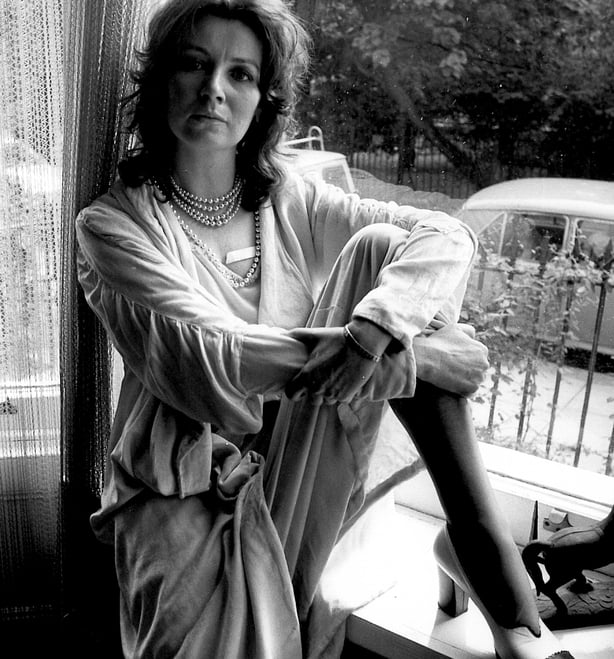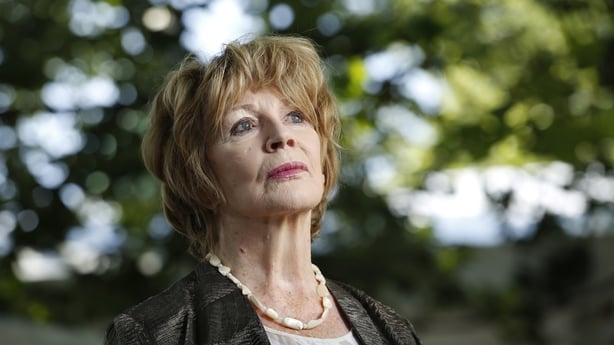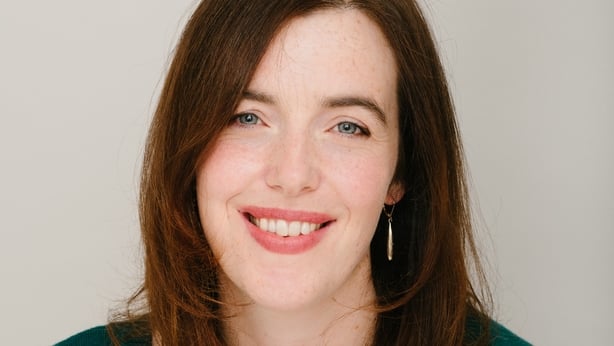Long Read: Originally from Navan in Co. Meath, Sinéad O'Shea is an acclaimed writer, journalist and filmmaker.
Her acclaimed feature documentaries A Mother Brings Her Son To Be Shot, about paramilitary violence in Northern Ireland, and Pray For Us Sinners (2023), an exploration of systemic abuse in her hometown, marked her as a filmmaker engaged with interrogating established narratives relating to Irish history.
Her latest project, Blue Road: The Edna O'Brien Story, centres on Edna O’Brien, the remarkable Irish novelist, memoirist, playwright, poet and short-story writer who sadly passed away last summer.
Winner of the Best New Irish Feature Award at the 69th Cork International Film Festival, in Blue Road O'Brien recounts her controversial life, novels, love affairs, and stardom through personal journals read by actress Jessie Buckley, with contributions from Gabriel Byrne, Doireann Ní Ghríofa, Anne Enright and other luminaries, including her sons Carlo and Sasha Gebler.
Sinead talked to RTÉ Culture just before Blue Road was shortlisted for the George Morrison Feature Documentary prize at this year's IFTA Awards.
What was your first experience of Edna O'Brien?
I had to interview her for an American magazine 10 years ago, and this will sound was terrible (laughs), but when I got the commission, I thought, it's going to be really dull, because my sense of her was that she was quite a frothy writer. It's so shameful that I thought this, and I had studied English literature in college, but she wasn't in the curriculum. There was just no sense of her being a literary person. I think for women who were a little older, there was an idea of her as being this big potent, literary force, but that had kept diluting by the time it got to us.
Had you read her work at that point?
No. So then I had to read her for this interview and I read Country Girls, and I just loved it, I just felt like this was my life story and that it was really relevant to being a girl in the '90s. And then I read her memoir, Country Girl, which is brilliant, and proved that she had had one of the great lives, I think, of the 20th century. It's amazing. She encompasses so many people.
We need your consent to load this rte-player contentWe use rte-player to manage extra content that can set cookies on your device and collect data about your activity. Please review their details and accept them to load the content.Manage Preferences
Listen: Sinead O'Shea talks to Miriam O'Callaghan about Blue Road
So it's this huge life. And then I met her and she's so charismatic. Within minutes, you're telling her everything and you want to dazzle her, but she is, of course, the most dazzling person ever. I loved her. And also, her vulnerability made a big impression on me. As extraordinary as her life had been, she seemed lonely; she was renting, and was really concerned about money, and I was surprised that someone who had achieved so much could be like that.
So then I was at a wedding two years ago, and I struck up a conversation with a stranger and we were talking about bad romances, and I quoted Edna O'Brien to her and she said, "She would be a great person to make a documentary about." And I knew straight away that was true. That was the genesis of it.
And when you met her again, 10 years on, was there any connection there from your previous encounter?
Oh, no, no, no. For Edna that was just another day for her - everyone she met would think about her for years afterwards. In fact, I would even say that throughout this whole process, I barely registered as a presence for her, except as this kind of receptacle for her various memories. Which is fine. I do think as a documentary maker, you have to resign yourself to being a kind of a ghost. You can't have any ego if you want to be good at making documentaries.

Blue Room is different to your other films, where you're more front and center as a presence.
Not really. I would say, anyone who's been a participant in films I've been directing would, I doubt I've made any impression on them at all.
Is that you doing your job well? Because ultimately, in a way, you become a vessel to let them talk.
Yeah, I think I'm a good facilitator. I don't want to be too grandiose about it, but I do think there's a way of helping people feel understood and not overpowering them that you can do quite well as a documentary maker.
How did you then approach Enda to participate in the film?
So basically that wedding guest was Barbara Broccoli, who makes the James Bond movies. And I spent a year trying to ask Edna if she'd like to do this film through her agent who couldn't really get through to her. So eventually Barbara called to her house - she had seen my Navan film, Pray For Our Sinners at that stage. And so I don't really know how she sold it to her exactly, but she just said, "Look, there's this girl that wants to make a documentary about you. You probably won't lose anything in particular." I actually don't really know. And I think Edna was a bit wary because she has been, I think, denigrated very badly over the years. So Barbara has this story: Edna's like, "She won't skewer me, will she?" And Barbara said, "No, I don't think she will."

to have a kind of final word' (Pic: Murdo MacLeod)
In the film, you're interviewing somebody actively aware of their mortality.
She was very upset. It's unspeakable. It's just awful to know that you're dying and you can't do anything about it. I mean, maybe you could say that's the human condition, but for it to be so imminent... So she knew this was the last chance to address certain things. Edna was also someone who had felt all those barbs. She didn't just shrug off the insults that she had garnered over the years, and she did feel wrongs and injustices very deeply. So I think she was very determined to have a kind of final word.
It feels like a final performance, because I think she was a very performative person by nature.
Yeah, it's amazing. And it was amazing to be in the room. So difficult at times, too, because she's so weak and she's so thin and she's close to death, but still there's this will - it's like Beckett, Not I, this voice is just coming out, her voice and her thoughts, they're working, even though nothing else is working. I just thought it was incredible. I love her for doing that. She was a very difficult person, she would say it herself, but she was a magnificent person. An extraordinary person.
I do think as a documentary maker, you have to resign yourself to being a kind of a ghost. You can't have any ego if you want to be good at making documentaries.
What were you trying to achieve? Did you want to make a case for Enda and her work? She had said many controversial things over the years.
I mean, some of the things she's done I really don't agree with. I think she was her own worst enemy, at times, and I definitely think she was a difficult person, but I also thought she was very unfairly treated. She was subjected to standards that no male writer has ever been subjected to.
But if I'm really honest, I think I did make this film for my own selfish reasons, because I just found her riveting. I like her world, and the people in it. 'Like' isn't quite the right word, but I find it fascinating. I love the histories she traverses, there are so many.
It's a shame she doesn't get to enjoy this final victory lap, of sorts.
I guess that was our hope, that she'd at least see a cut of the film because she had rallied again and again. There were lots of times over the year where we thought 'Well, that's it. Now she's gone'. She'd be hospitalized. She wouldn't be able to eat. It really would seem like that was the end, but then she'd rally. So I guess I had this idea that she was going to rally again once the film premiered, but that didn't happen.

The film was completed very quickly, in order to premiere at the Toronto Film Festival...
It did consume me. The edit was difficult because the timing was so crazy, we had a rough cut accepted into Toronto, but that only gave us - the editor Gretta Ohle and I - seven weeks to finish the film, and it was just a very, very hard schedule. Maybe this is going to sound ridiculous, but it just was one of the best experiences of my life, editing it with Gretta, it was just so stimulating and so interesting. It just really locked me in.
You condense a lot of fascinating material into a relatively short running time...
I mean, maybe the film is too short. A lot of people have said to me, "Where's this, this, and this?" And it's true. I could easily have made it much longer, but it's very intense, the film. You can watch it again. I suppose the timeframe we made it in was so pressurized that you had to be completely obsessed, and make decisions very quickly.
If you're going to be obsessed with somebody, Enda O'Brien is a pretty ideal candidate.
People are very obsessed with her, whether they hate her or like her. I remember Anne Enright saying that people are never ambivalent about her; they never say "I don't mind her." People fixate on her. Even now, she really gets to people.
Blue Road is in Irish cinemas nationwide from Friday, January 31st
This conversation has been edited for clarity.


